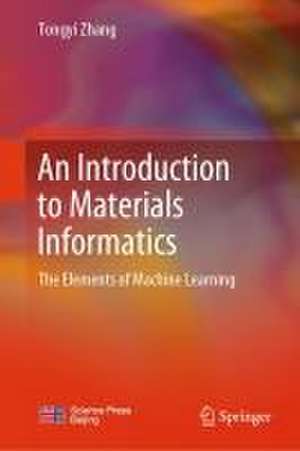An Introduction to Materials Informatics : The Elements of Machine Learning
Autor Tongyi Zhangen Limba Engleză Hardback – 6 sep 2024
Preț: 545.82 lei
Preț vechi: 713.91 lei
-24% Nou
Puncte Express: 819
Preț estimativ în valută:
104.44€ • 108.83$ • 86.48£
104.44€ • 108.83$ • 86.48£
Carte nepublicată încă
Doresc să fiu notificat când acest titlu va fi disponibil:
Se trimite...
Preluare comenzi: 021 569.72.76
Specificații
ISBN-13: 9789819979912
ISBN-10: 9819979919
Pagini: 465
Ilustrații: XVI, 465 p. 137 illus., 126 illus. in color.
Dimensiuni: 155 x 235 mm
Ediția:1st ed. 2024
Editura: Springer Nature Singapore
Colecția Springer
Locul publicării:Singapore, Singapore
ISBN-10: 9819979919
Pagini: 465
Ilustrații: XVI, 465 p. 137 illus., 126 illus. in color.
Dimensiuni: 155 x 235 mm
Ediția:1st ed. 2024
Editura: Springer Nature Singapore
Colecția Springer
Locul publicării:Singapore, Singapore
Cuprins
Introduction.- Linear Regression.- Linear Classification.- Support Vector Machine.- Decision Tree and K-Nearest-Neighbors (KNN).- Ensemble Learning.- Bayesian Theorem and Expectation-Maximization (EM) Algorithm.- Symbolic Regression.- Neural Networks.- Hidden Markov Chains.- Data Preprocessing and Feature Selection.- Interpretative SHAP Value and Partial Dependence Plot.
Notă biografică
Tongyi Zhang, born in October 1949 in Zhengzhou, China, is Expert in the interdisciplinary area of materials science and engineering and solid mechanics. He received his Ph.D. in 1985 in materials physics from the University of Science and Technology Beijing, China. He was Research Fellow of the Alexander von Humboldt Foundation, 1986-1988, Germany; Postdoctoral Fellow, 1988-1990, University of Rochester; and Associate Research Scientist, 1990-1993, Yale University. From 1993 to 2015, he worked at the Hong Kong University of Science and Technology, as Lecturer, Associate Professor, Professor, Chair Professor, and Fang Professor of Engineering.
He is the founding dean of Materials Genome Institute, Shanghai University, and the founding director of the Materials Genome Engineering division in the Chinese Materials Research Society (CMRS). Currently he is doing his best to promote Materials Genome Engineering and Materials/Mechanics Informatics, especially, materials AI labs, materials AI computations, and materials large multimodal model. He is the Vice President of the International Congress on Fracture, the Honorary President of the Chinese Society for Corrosion and Protection, and was the Vice President of the Far East and Oceanic Fracture Society. He is the founding Editor-in-Chief of Journal of Materials Informatics and was the Editor-in-Chief of Science China Technological Sciences 2018-2022. He became Fellow of International Congress on Fracture in 2013, Fellow of the Hong Kong Academy of Engineering Sciences in 2012, Member of Chinese Academy of Sciences in 2011, Senior Research Fellow of Croucher Foundation, Hong Kong, in 2003, Fellow of ASM International, USA, in 2001. He received the awards including the 2018 Prize for Scientific and Technological Progress from the HLHL Foundation, the Second Prizes of 2007 and 1987 State Natural Science Award, China, and the 1988 National Award for Young Scientists, China.
He is the founding dean of Materials Genome Institute, Shanghai University, and the founding director of the Materials Genome Engineering division in the Chinese Materials Research Society (CMRS). Currently he is doing his best to promote Materials Genome Engineering and Materials/Mechanics Informatics, especially, materials AI labs, materials AI computations, and materials large multimodal model. He is the Vice President of the International Congress on Fracture, the Honorary President of the Chinese Society for Corrosion and Protection, and was the Vice President of the Far East and Oceanic Fracture Society. He is the founding Editor-in-Chief of Journal of Materials Informatics and was the Editor-in-Chief of Science China Technological Sciences 2018-2022. He became Fellow of International Congress on Fracture in 2013, Fellow of the Hong Kong Academy of Engineering Sciences in 2012, Member of Chinese Academy of Sciences in 2011, Senior Research Fellow of Croucher Foundation, Hong Kong, in 2003, Fellow of ASM International, USA, in 2001. He received the awards including the 2018 Prize for Scientific and Technological Progress from the HLHL Foundation, the Second Prizes of 2007 and 1987 State Natural Science Award, China, and the 1988 National Award for Young Scientists, China.
Textul de pe ultima copertă
This textbook educates current and future materials workers, engineers, and researchers on Materials Informatics. Volume I serves as an introduction, merging AI, ML, materials science, and engineering. It covers essential topics and algorithms in 11 chapters, including Linear Regression, Neural Networks, and more. Suitable for diverse fields like materials science, physics, and chemistry, it enables quick and easy learning of Materials Informatics for readers without prior AI and ML knowledge.
Caracteristici
Is a textbook for readers in various fields, such as materials science and engineering Writes in a comprehensible way with detailed examples Adopts artificial intelligence (AI), machine learning (ML) in the fields of materials science and engineering
